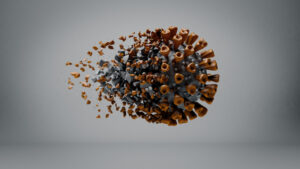The COVID-19 pandemic has caused substantial morbidity and mortality. One study estimates that close to 13% of infected individuals experience post-COVID symptoms (“long-COVID”) lasting at least 12 weeks following infection. One theory behind the pathophysiology of the post-COVID condition (PCC) is that the symptoms are caused by “microclots” composed of amyloid and fibrin and or fibrinogen [fibrin(ogen)] circulating in the blood, and some institutions are performing plasmapheresis to remove these particles. To investigate whether these amyloid fibrin(ogen) particles could cause PCC and whether plasmapheresis is an effective treatment, researchers from the Cochrane Library performed a systematic review. Only five studies, however, were identified which assessed whether amyloid fibrin(ogen) particles were present in the blood of individuals with PCC. Amyloid fibrin(ogen) particles were found not only in people with PCC but also in heathy individuals and people with type-2 diabetes. Furthermore, no randomized clinical trials were identified assessing the safety or efficacy of plasmapheresis to remove amyloid fibrin(ogen) particles. Further research is needed on the causes of PCC and effective treatment options.
Reference:

